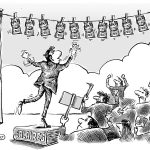The time of ruptures
In Venice, G-20 ministers and central bankers are showing a common front. Will it last?
This year Venice meeting is reminiscent of another. In November 2008, in the midst of the financial and economic turmoil, the meeting of G-20 Heads of State in Washington was hailed as a historic first step towards strengthened and expanded economic and political cooperation.
It would be easy to give in to cynicism by declaring the intentions of the time remained empty rethoric. The strengthening of the regulation of the markets and the financial system has indeed been undertaken. The enlargement of the G7 to include a broader and more representative forum of the world is a reality. The rejection of protectionism, expressed at the time, has withstood the turmoil of the moment, while the foundations were laid for a reform on tax transparency, which has given birth to the general agreement on the imposition of a minimum tax on companies.
More than a year after the outbreak of the Covid-19 pandemic, the G-20 ministers and central bankers meeting in Venice show a similar willingness to cooperate and coordinate. Paradoxically, this manifests itself first and foremost in the recognition of the significant divergences that mark the current economic rebound, both from one sector of activity and from one country to another.
The increase in public debt leaves little room for manoeuvre to governments, while the “whatever it costs” moto is coming to an end.
Still under the threat of the pandemic, the world is fracturing. For the first time in 25 years, the catching-up process of emerging countries is stalled. Rising prices for industrial and food raw materials pose a serious threat to many populations. Vaccination is slow to be deployed in the poorest countries, most threatened by the surge in a new variant.
With previous experience and aware of the risks associated with the arrival of a new viral wave, the G-20 is committed to display and exercise more solidarity. The most advanced economies promise not to withdraw state aid too soon. Similarly, the IMF’s $650 billion aid package (via a new SDR issue) was approved. Finally, 13 years after the first agreements in this field, the OECD plan for minimum taxation of companies is endorsed by all the countries present (and even beyond) who are committed to implementing it by next October. Climate commitments – albeit with some limitations – are also reaffirmed.
Too little, too late, the most sceptical will say. Behind this unanimous front, we can detect deepening fractures. Does the euphoria of the financial markets mask the fragilities of sectors of activity for some depressed and for others under stress due to the disruption of value chains and price increases?
Geostrategic and commercial tensions between East/West and North/South, far from easing, could be stirred up under the weight of the disarray and discontent of the hard-hit populations, and the superpowers renewed ambitions. The increase in public debt leaves little room for maneuver to governments, as the “whatever it costs” moto is coming to an end.
In the face of this momentum of unity and solidarity, will centrifugal forces regain the upper hand?
Valérie Plagnol – 12 July 2021 – Published in French in www.allnews.ch – Cartoon ©Barret



